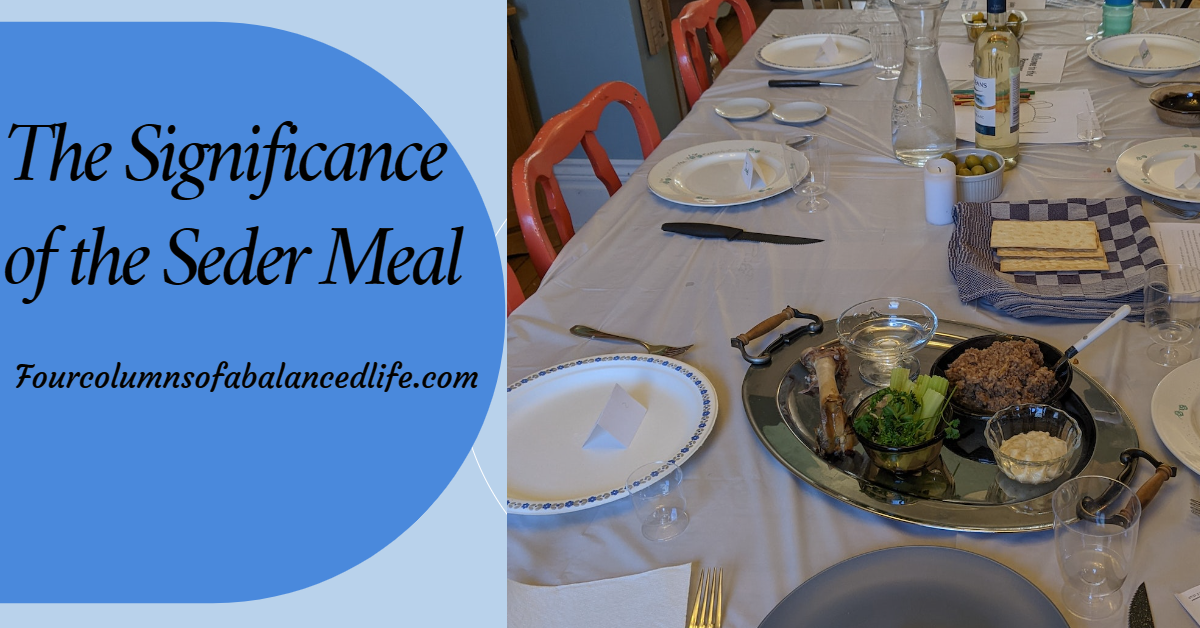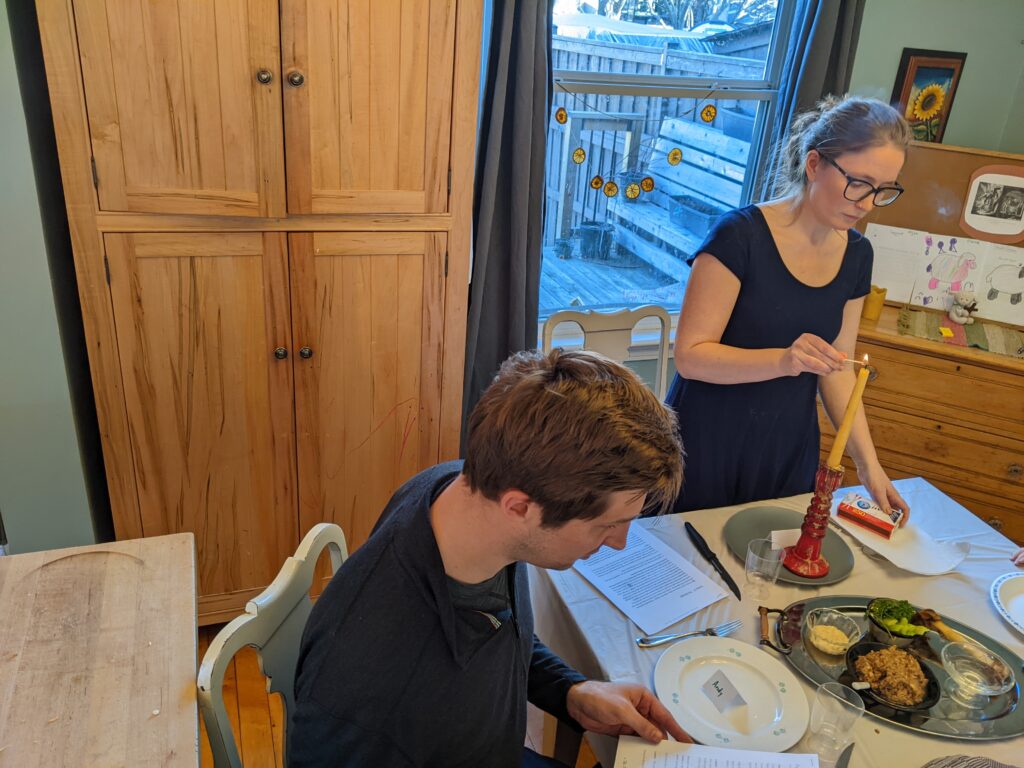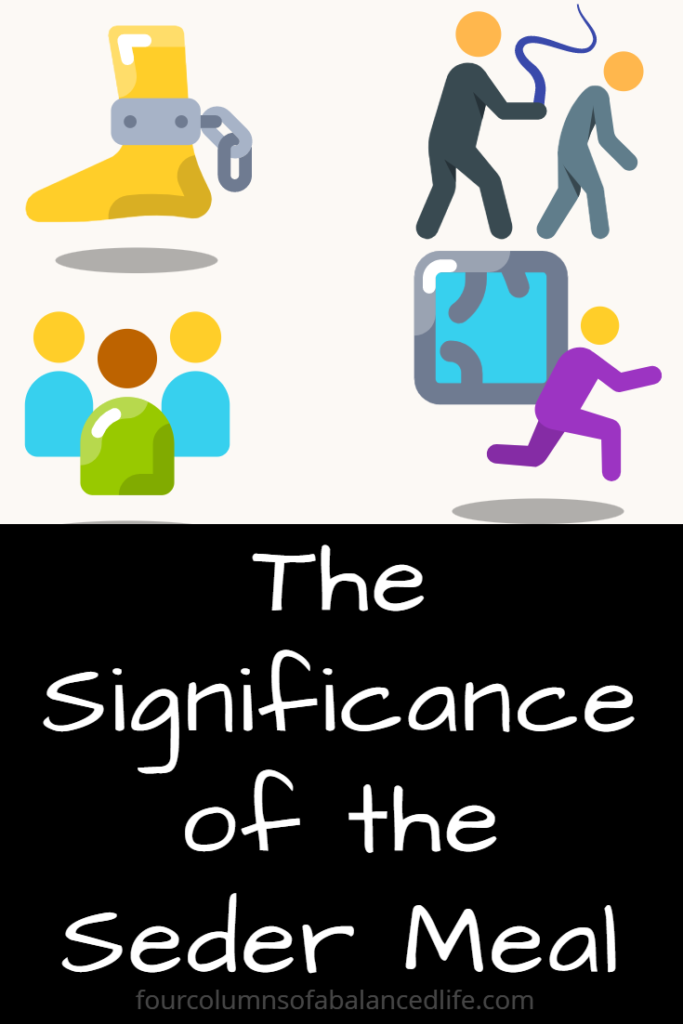
The Significance of the Seder Meal

What is a Seder meal?
A Seder meal is a traditional Jewish meal that is held on the first night of Passover. The word “Seder” means “order” in Hebrew, and the meal follows a specific order or sequence of events that is outlined in the Haggadah, a text that tells the story of the Jewish people’s exodus from Egypt.
During the Seder, family, and friends gather around the table to retell the story of Passover through a series of symbolic foods and rituals, including eating matzah (unleavened bread), drinking four cups of wine, and dipping vegetables in salt water. The Seder also includes reciting blessings and prayers, singing traditional songs, and engaging in lively discussion and debate about the meaning of the Passover story and its relevance to our lives today. The Seder is a time for reflection, celebration, and connection to Jewish history.
It’s Good Friday and I am heading to Andy and Gwen Groen’s home to experience Seder.
What does the Seder meal consist of
The Seder meal consists of a sequence of symbolic foods and rituals that tell the story of the Jewish people’s liberation from slavery in ancient Egypt.
Matzah
Unleavened bread represents the haste with which the Israelites fled Egypt.
Maror
Bitter herbs, such as horseradish or romaine lettuce, represent the bitterness of slavery.
Charoset
A sweet paste made from fruit and nuts, which represents the mortar used by the Israelite slaves to build the pyramids in Egypt.
Karpas
A vegetable, such as parsley or celery, is dipped in salt water to represent the tears shed by the Israelites in slavery.
Zeroa
A roasted lamb shank bone or a chicken wing represents the Paschal sacrifice.
Four cups of wine
Each cup represents a different stage of the Exodus story, and the drinking of the wine symbolizes the joy of freedom.
Haggadah
The Jewish text tells the story of the Exodus.
What is the purpose of the Seder meal?
In addition to these symbolic foods, the Seder includes reciting blessings and prayers, singing traditional songs, and engaging in discussion and debate about the meaning of the Passover story and its relevance to our lives today.
The Seder meal is an important part of the Jewish holiday of Passover, and it serves several purposes:
Remember Jewish history
The Seder tells the story of the Jewish people’s exodus from Egypt, which is a central event in Jewish history. By retelling this story year after year, Jews remember their ancestors’ struggles and celebrate their eventual freedom.
Transmitting Jewish traditions
The Seder is a time for families and communities to come together and share in Jewish traditions, such as reciting the Haggadah, singing traditional songs, and eating symbolic foods. By participating in these rituals, Jews pass down their cultural and religious heritage from generation to generation.
Reflecting on personal freedom
The themes of slavery and freedom in the Passover story can also serve as a metaphor for personal struggles and liberation. By engaging in discussion and debate about the meaning of the Passover story, Jews can reflect on their own lives and strive to find freedom from whatever oppresses them.
It is Good Friday and I am heading to Andy and Gwen’s place to experience the Seder meal.
There are 18 of us and we are all seated at the table.
Andy starts with Kadesh (benediction) explains the importance of the Seder meal and Gwen lights a candle.
During the Seder meal, we drink four glasses of wine to represent redemption in Exodus 6: 6-8 where God says i) I shall take you out ii) I shall rescue you iii) I shall redeem you, and iv) I shall bring you.
Andy reminds us that while drinking the wine, we need to lean on our left side and recline while eating as only free people did that and not slaves.

We now have the symbolic karpas (appetizer) where we dip parsley into salt water and eat it. Karpas when read backward refers to the hard work performed by the 600,000 Jews in Egypt.
It is time for yachts, the breaking of the matzah. Andy talks about Exodus and how God’s children crossed the sea. The children are curious.
The kids ask questions “Why is this night different from all other nights? Why only matzah? Why the dipping? Why the bitter herbs? Why are we relaxing and reclining as if we were kings?” Andy reads about Abraham and the miracles performed by God.
We eat the matzah, leaning to our left, and eat while reclining.
We now dip parsley in the salt water and eat it. We take celery and dip it in the charoset. We dip the matzah in the maror and eat it while reclining.

The matzah is wrapped prior to being hidden to duplicate how the Sons of Israel carried the dough out of Egypt.
We now have our delicious meal.

We now drink the third glass of wine and Andy recites the blessings.
We sing praise to God and drink the fourth cup, reclining.
After an amazing meal, we sing praise again and we say to each other ‘Next year in Jerusalem’.
I have an amazing conversation with Gwen about her life. After dessert, I have a deep conversation with Andy. I am deeply moved by this couple who serve us.
I am so grateful to Gurpreet Singh who took my family to experience langar at a Gurdwara. We learned so much about Sikhism and hospitality.
Jayshree talked to Four Columns about the Hindu festival of Diwali and how it represents the triumph of good over evil.
Sabika Hassan talked about her Muslim faith and Islam as a religion of peace, minimalism, humanity, finding resilience & strength in God during dark times, being grateful for the small stuff, and always standing up for the rights of the oppressed.
Farzana talked about Zarathustra as the Founder of Zoroastrianism. It is the world’s oldest monotheistic faith. Zoroastrians believe in one God, called Ahura Mazda, who is the creator of the universe. The basic ethic of our faith is Good Thoughts, Good Words, and Good Deeds. If we follow this, everything else will fall into place.
Four Columns has interviewed Ministers, Pastors, and adherents of Evangelical, Catholicism, ICOC, and various other Christian denominations in understanding Faith and how it can bring us closer.
Hospitality is the practice of providing a welcoming and generous reception to guests or strangers, often involving offering food, shelter, and other forms of assistance. This practice is deeply rooted in many faith traditions and can teach us a great deal about our beliefs and values.
One of the key teachings of hospitality is the importance of compassion and empathy towards others. Many faiths emphasize the value of treating others with kindness and respect, regardless of their background or circumstances. By extending hospitality to others, we can demonstrate this value in a concrete and tangible way.
Hospitality can also teach us about the value of community and connection. By welcoming others into our homes and lives, we can build relationships and form bonds that transcend cultural and social barriers. This can help to foster a sense of belonging and mutual support that is crucial for our spiritual and emotional well-being.
Another important lesson that hospitality can teach us about faith is the value of selflessness and sacrifice. In many faiths, we are encouraged to put the needs of others before our own and to make sacrifices for the sake of others. By opening our homes and lives to others, we can practice this value in a meaningful way and develop a deeper understanding of its importance.
Overall, hospitality is a powerful practice that can teach us many important lessons about our faith and values. By extending kindness and generosity to others, we can strengthen our spiritual and emotional connections and develop a deeper understanding of the world around us.
Today’s cultural appropriation police engage in overkill in realms besides religion. University of California-Irvine law professor Olufunmilayo Arewa: ‘The reality of human experience is that borrowing and cultural mixture are widespread. This is evident in language, religion, agriculture, folklore, food and other cultural elements. … Discussions of appropriation may also take insufficient account of the importance and benefits of borrowing. Borrowing has led to the international spread of denim, mathematics, and even democracy’.
Religious scholar Mark Silk argues that “Christians started off as Jews, and if we started to ask them to strip away all the Jewish textual and liturgical and theological appropriations they’ve made over the years, there wouldn’t be a lot left of the religion.”
I went for fellowship and to find out about the roots of my faith, I discovered it.
After attending the Seder dinner, I am more aware of the Jewish faith and respect it for everything it represents.


This is very fascinating. I love the idea of hosting a seder meal as a Christian.
I’m so glad to read this! The seder meal is one that fascinates me and I’d love to know even more about it. Thanks for sharing your experience with us!
An amazing piece of love, grace, kindness and hospitality of a community. Thanks for this write up.
Thanks, Jerry for writing on Hinduism, Christianity, the Muslim faith, Parsis, and now about your meal. Having a meal with someone is a life-changing experience. Thanks
Table fellowship of the very best kind! I loved so many things about this experience. Grateful that you took the time to capture the warmth, remembrance, and sacredness of the seder. Thank you for sharing it with us, Jerry.
Community at its best. I see nothing but love, giving respect to Jewish heritage and the author sharing from his heart 🙏❤️ an amazing experience.
Seder is about the powerful gifts of hope, grit and gratitude. As a follower of your blog for the last 4 years you continue to write and interview different people that resonate these qualities. You are part of an amazing community and you open to outside ideas and that is what I love about your blog.